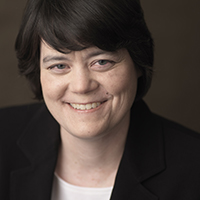By Ricson Chude, P.E., Member ASHRAE
2018–19 President–Elect, ASHRAE Southern California Chapter
From eSociety, April 2018
In the ASHRAE Southern California Chapter’s past March meetings, as a tradition in our Chapter, we celebrate the valuable contribution of Women in ASHRAE.
This past month was no different, and the ASHRAE Southern California Chapter was honored to welcome ASHRAE Fellow Erin McConahey, P.E., to share her presentation titled, “An Inclusion Mindset.”

ASHRAE Fellow Erin McConahey, P.E.
While many know McConahey as an accomplished mechanical engineer with more than 20 years of work in the Los Angeles office of Arup, her leadership contributions were a refreshing surprise to some attendees.
For the past six years, in addition to her design and project management duties, McConahey was Arup’s Diversity and Inclusion Advocate for the Americas Region. These were the opening questions that centered the presentation and brought purpose and relevance to the topic:
-
“How many of you think that you can waste or lose talent, given your current workload?”
-
“How many of you think you’d stay in a place that didn’t appreciate your talent?”
With lots of research data and personal stories, McConahey was able to bring the room together in a frank conversation about equality, diversity and inclusion unlike any other.
As engineers, we may be too busy to notice certain behaviors or statements, which may be viewed as constant acts of as micro-inequity towards women or other minority groups.
As she shared with the audience, bias can be described as "mental associations that are so well-established as to operate without awareness, or without intention, or without control”—essentially a shortcut that our brains take to make judgments on a person or situation. Now, while it can be useful in some instances—say to detect and avoid dangerous situations—in other instances due to the environment we grew up, pop culture, or past experiences it leads us to make generalizations that negatively impact others around us, including in our workplace.
In a presentation that was both inspiring and challenging, McConahey called upon the audience to look back and revisit times where they allowed unconscious bias towards women or other minorities miss an opportunity to hire, promote and provide valuable honest feedback. Sharing her very own experiences with the audience, McConahey provided suggestions to overcome these challenges and emphasized that being aware of our natural bias is the first step.
One of the key things to remember is that we all play a role in making our workplaces the most conducive for all team members—regardless of gender.
As the meeting ended, many stayed seeking to share their experience and thank McConahey for the thought–provoking presentation. Like many, I was happy to have attended the meeting and learn about both the science and data behind this very relevant topic.
On behalf of the ASHRAE Southern California Chapter, I thank McConahey for her contribution to the chapter program.